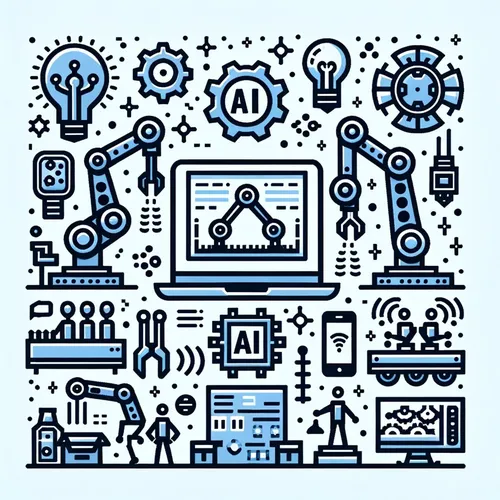AI Robots Stealing Jobs? Manufacturers Spill Secrets on Skyrocketing Automation!
- Author
- Quiet. Please
- Published
- Sat 06 Sep 2025
- Episode Link
- https://www.spreaker.com/episode/ai-robots-stealing-jobs-manufacturers-spill-secrets-on-skyrocketing-automation--67652602
This is you Industrial Robotics Weekly: Manufacturing & AI Updates podcast.
Industrial robotics is driving a transformative wave across global manufacturing, powered by advancements in artificial intelligence, flexible deployment models, and the relentless push for efficiency. As we move into September 2025, the industrial automation sector is witnessing unprecedented integration of artificial intelligence and machine learning. These technologies now support smart factories where machines continuously communicate, rapidly analyze real-time data, and self-optimize to minimize downtime, reduce defects, and improve yield. Industry surveys highlight that nearly ninety percent of manufacturers have now adopted or plan to implement artificial intelligence-driven solutions, with computer vision and predictive maintenance at the forefront. This is not just boosting productivity but also supporting safer environments by removing workers from hazardous repetitive tasks, as reported by Hanwha and the Manufacturing Leadership Council.
Recent news includes the International Federation of Robotics announcing that global industrial robot installations have reached a record value of sixteen and a half billion United States dollars. Robots have now become cornerstones in producing everything from solar panels to electric car batteries, enabling companies to scale up green energy production and align with demanding sustainability targets. Elsewhere, Robot-as-a-Service models are gaining traction, allowing small and medium manufacturers to deploy the latest robotic solutions with no fixed capital investment, according to the International Federation of Robotics. Another notable development comes from Standard Bots, introducing no-code frameworks with robots such as RO1, which allow quick integration into legacy systems and lower barriers to automation for companies of all sizes.
Efficiency metrics continue to improve: according to Gray Matter Robotics, artificial intelligence-powered deployments have led to productivity gains of up to twenty-five percent in precision assembly and materials handling, with quality control errors dropping below one percent in deployed use cases. Human-robot collaboration is advancing rapidly, with smarter sensors and interface standards enabling robots to complete complex tasks alongside personnel, supporting both safety and job satisfaction as highlighted by WiredWorkers. Return on investment analyses now show that for many applications, payback periods have dropped below eighteen months, thanks to modular and flexible robotics that scale with business needs.
Looking ahead, industry experts forecast robust growth for hybrid and process industries—not just the traditional automotive or electronics sectors, but also pharmaceuticals and food, which are set to see the fastest automation adoption through the end of the decade. Today’s practical actions for manufacturers are clear: assess existing workflows for automation potential, invest in modular robot solutions with scalable deployment options, and upskill teams for a future where human-machine partnership is the standard. Listeners can expect even more rapid innovation in process optimization and warehouse automation, with ongoing improvements in technical standards ensuring interoperability and continuing regulatory support for safety and sustainability.
Thank you for tuning in to Industrial Robotics Weekly. Join us again next week for more crucial updates in manufacturing and automation. This has been a Quiet Please production; for more, check out Quiet Please Dot A I.
For more http://www.quietplease.ai
Get the best deals https://amzn.to/3ODvOta
